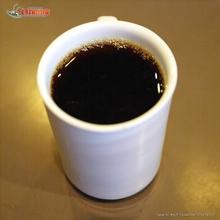Introduction to the characteristics of boutique coffee beans in Guatemala Antigua Flower God Coffee producing area
On the menu of some high-end cafes, Guatemala Antigua coffee is definitely included in the "origin coffee" column. People who like it always think about its special smoke fragrance. Coffee created prosperity for Guatemala. Coffee continues to influence Guatemala's economy to this day.
Antigua is the oldest and most beautiful city in America. As early as 1543, Antigua was the colonial capital of Central America, and the Spanish government was also located here. After a major earthquake in 1773, Antigua was completely destroyed, so the capital was moved to Guatemala. Antigua City is about 40 kilometers west of Guatemala City. Colonial buildings were destroyed by the earthquake. After the earthquake, the original state was preserved as a whole. It can be said to be a living historical museum. Antigua coffee is grown in Antigua, on the slopes of the volcanic heartland, where it grows naturally in the rain and sun.
Antigua coffee dates back to the Mayan civilization. Due to volcanic eruptions, the soil here is more nutritious, and sufficient sunlight and moisture also make the coffee produced excellent quality. Most importantly, the residents here insist on growing Arabica bourbon coffee, although the yield is small, but the quality is better. Antigua's inhabitants, who grow coffee on a large scale, like to harvest it all at once and use the ancient sun method to remove the skin and pulp from the coffee fruit. People pluck ripe fruit and unripe fruit together, even mixing leaves with them and spreading them out in the sun. When spread on the ground for a long time, coffee beans easily absorb the impurities of the soil, so they often have an odd salty taste. The taste is often unbearable to first-time tasters, but people who are used to it like it. Coffee farmers in Antigua earn very little. But they themselves say that even if they are poor, they still feel happy because of coffee. This is because Guatemala is located in the tropics. The northern and eastern coastal plains have a tropical rain forest climate, and the southern mountains have a subtropical climate. There are two dry and wet seasons in the year. The wet season is from May to October, and the dry season is from November to April.
The central plateau is also the cultural center of Guatemala, where temperatures are mild all year round at 1300 to 1800 meters, with daily temperatures ranging from 18 to 28 ° C, and colder January and February at higher altitudes. Annual precipitation is 2000-3000 mm in the northeast and 500-1000 mm in the south, while ecological conditions in the south are very suitable for the growth of high-quality Arabica trees. What is more special is that there are several active volcanoes distributed in the southern mountainous areas. These active volcanoes still erupt irregularly. Although they bring turbulence to the lives of local people, their rich volcanic ash soil also benefits the local coffee industry and brings rich substances to coffee cultivation.
And Guatemala coffee beans mostly belong to the Bourbon species of Arabica, so Guatemala coffee growing areas are almost all in the southern mountain forest areas of the country.
In Guatemala, there are seven major coffee producing areas, each producing coffee flavor is different, but in summary, Guatemala coffee presents a mild and mellow overall texture, elegant aroma, and with a pleasant acidity similar to fruit acid, like a coffee aristocrat, among which Antigua coffee (Antigua Classic) is deeply recommended by coffee gluttons around the world

Important Notice :
前街咖啡 FrontStreet Coffee has moved to new addredd:
FrontStreet Coffee Address: 315,Donghua East Road,GuangZhou
Tel:020 38364473
- Prev

Description of the characteristics and taste of high-quality coffee beans in Jinchu Coffee Variety producing area in Kenya
There are two types of coffee farms in Kenya. One is a large plantation that covers an area of more than five acres, but the average elevation is low. In the case of Kenyan coffee, the coffee beans of the large farms are of medium quality. The best Kenyan beans come from small farms, most of which are located in the foothills or volcanic slopes above 5,000 to 6,000 feet. Each small farmer has a capacity of only 20 to 70 bags per season.
- Next

Description of Panamanian Coffee Variety producing area Coffee Bean Flavor and Taste Manor
Panama is located in the isthmus of Panama in Central America, bordered by Colombia to the east, the Pacific Ocean to the south, the map of Panama to Costa Rica to the west and the Caribbean Sea to the north. The land is S-shaped to connect North and South America, and the Panama Canal connects the Atlantic Ocean and the Pacific Ocean from north to south. There are bridges in the world that Panama is rich in forest resources and has many tree species, including peach blossom.
Related
- Detailed explanation of Jadeite planting Land in Panamanian Jadeite Manor introduction to the grading system of Jadeite competitive bidding, Red bid, Green bid and Rose Summer
- Story of Coffee planting in Brenka region of Costa Rica Stonehenge Manor anaerobic heavy honey treatment of flavor mouth
- What's on the barrel of Blue Mountain Coffee beans?
- Can American coffee also pull flowers? How to use hot American style to pull out a good-looking pattern?
- Can you make a cold extract with coffee beans? What is the right proportion for cold-extracted coffee formula?
- Indonesian PWN Gold Mandrine Coffee Origin Features Flavor How to Chong? Mandolin coffee is American.
- A brief introduction to the flavor characteristics of Brazilian yellow bourbon coffee beans
- What is the effect of different water quality on the flavor of cold-extracted coffee? What kind of water is best for brewing coffee?
- Why do you think of Rose Summer whenever you mention Panamanian coffee?
- Introduction to the characteristics of authentic blue mountain coffee bean producing areas? What is the CIB Coffee Authority in Jamaica?

